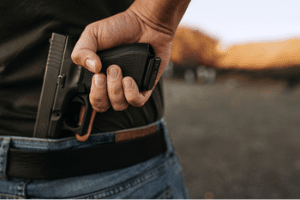Nevada has unique laws surrounding self-defense, gun ownership, and the use of deadly force. Two of the most frequently discussed legal concepts are Nevada’s Stand Your Ground law and the Castle Doctrine. Understanding how these laws work can help residents better recognize their rights and limitations in self-defense situations.
Self-Defense Rights For Legal Gun Owners in Nevada
Under Nevada Revised Statutes (NRS 200.120–200.190), individuals have the right to protect themselves when faced with an immediate threat of serious bodily harm or death. This framework outlines when force—up to and including deadly force—may be legally justified.
Key points include:
Not the Aggressor – The individual claiming self-defense must not have provoked the confrontation.
Reasonable Fear – Self-defense may apply if a reasonable person would believe they or someone else was in immediate danger of death or serious injury.
No Duty to Retreat – Nevada does not require a person to retreat before defending themselves, even if escape is possible.
Proportional Response – The force used must not exceed what is necessary to stop the threat.
Stand Your Ground in Nevada
Nevada’s Stand Your Ground law allows lawful gun owners to defend themselves without retreating. However, the law has important limits:
- Deadly force cannot be used solely to prevent nonviolent property crimes, such as car break-ins.
- Verbal threats alone—like someone shouting “I’m going to kill you”—do not automatically justify deadly force unless paired with actions that make the threat credible.
- The shooter must not be committing another crime at the time of the incident.
This means that while Nevada law provides broad self-defense protections, every situation is judged by what a “reasonable person” would have done.
Nevada’s Castle Doctrine
The Castle Doctrine provides additional protections for people inside their homes or vehicles.
- If someone unlawfully enters your home or car while you are inside, the law presumes that person intends to cause harm.
- You do not have to flee before acting in self-defense.
- This presumption can be challenged if evidence shows the intruder posed no real threat.
The Castle Doctrine reinforces the idea that individuals should feel safe in their own homes and vehicles, but again, it is not an unlimited defense.
Important Limitations
Nevada law also sets boundaries to prevent misuse of self-defense claims:
Provoking a fight cancels protection—if you start the confrontation, the law generally won’t protect you.
Fear alone is not enough—the threat must be immediate and credible.
Revenge is not self-defense—the law requires that actions stem from genuine fear, not retaliation.
Why This Matters
Nevada residents often hear about “stand your ground” or “castle doctrine” cases in the news, but the details of each case matter. Courts look closely at the facts—where the incident happened, who started it, and whether the response was reasonable.
Knowing the difference between permissible self-defense and unjustified use of force can prevent costly legal consequences.
Final Note
This article is intended for informational purposes only and should not be taken as legal advice. If you have questions about Nevada gun laws, self-defense rights, or the Castle Doctrine, consider consulting an experienced Nevada attorney who can provide guidance specific to your situation.


